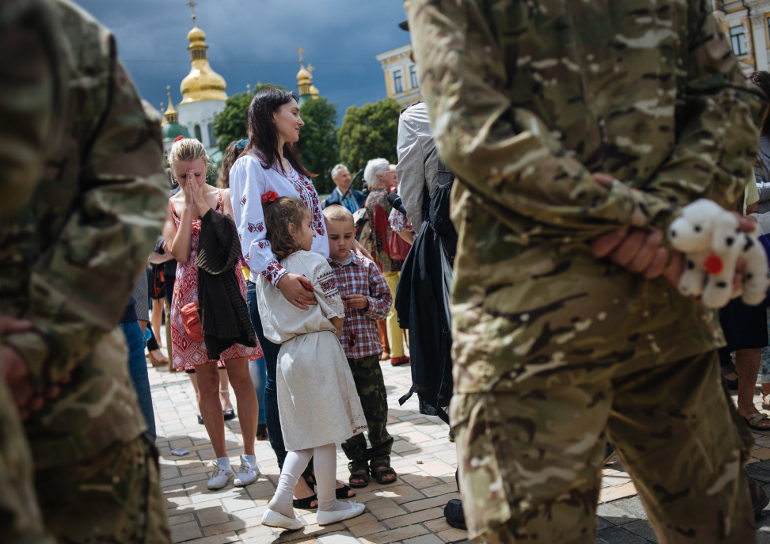
Relatives and friends attend an allegiance ceremony of a Ukrainian army battalion in Kiev before they depart to eastern Ukraine June 23. (CNS/EPA/Roman Pilipey)
The Ukrainian government plans to re-establish military chaplaincies in the country's embattled armed forces, nine months after they were abolished under Soviet rule.
Bishop Bohdan Dzyurakh, secretary-general of the Ukrainian Catholic Synod of Bishops, welcomed the announcement, saying the ministries offered by chaplains are "integral to meeting the spiritual needs of citizens, wherever they may be."
"We're delighted this work is now to be regulated by law, especially in today's dramatic circumstances," Dzyurakh told Catholic News Service July 3.
Ukrainian Prime Minister Arseniy Yatsenyuk told a cabinet meeting that military chaplains were needed to boost army morale, and to signal that "people of all faiths" supported the armed forces in their struggle with pro-Russia rebels in the eastern part of the country.
Dzyurakh said the Ukrainian Catholic Church had designated about 70 priests for work with the armed forces. About a dozen were serving in the eastern conflict zone, he said.
Representatives of various faith communities were represented on a pastoral council in Ukraine's Defense Ministry, which had drafted a code for military chaplains and regulations for chapels at military installations, the bishop added.
"We've first-hand evidence of how soldiers value the work of priests, willingly receiving sacraments and attending prayers and talks," Dzyurakh said.
"This pastoral service threatens no one, and we're pleased it's understood by military commanders. If Catholics are doing military service, they've a right to pastoral care, especially at this time of grave conflict on Ukrainian territory," he said.
Violence erupted in eastern Ukraine in April as separatists declared independence following Russia's March annexation of the Ukrainian region of Crimea. At least nine civilians were reported killed July 2 during an attack on a village near Luhansk, after a 10-day ceasefire collapsed June 30.
Dzyurakh said many priests were ready to serve with the Ukrainian army, especially in areas of military operations. He added that he believed the re-establishment of chaplaincies would have cross-party support.
"This pastoral service is clearly indispensable, especially when requests for priestly help are coming from the military itself," he said.
"Although some Ukrainians may oppose this move for ideological reasons, I don't think any responsible politician would do so given our country's current situation."
Plans for the restored chaplaincies follow criticisms by Russian Orthodox Metropolitan Hilarion Alfeyev, of Volokolamsk, director of foreign relations for the Moscow patriarchate, who told the Interfax news agency June 26 he believed that Ukrainian Catholic leaders were "representing Russia in demonic shape in their speeches," and conducting "anti-Russian rhetoric and attacks on the Russian Orthodox church" in Western countries.



